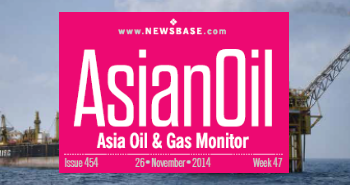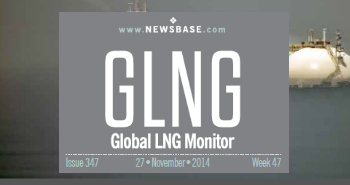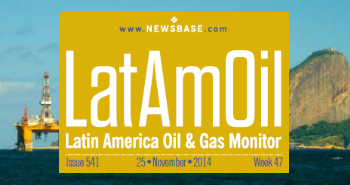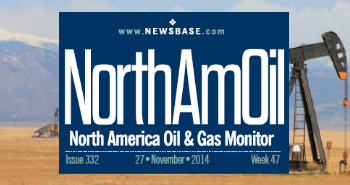NRG: LNG spikes, political swings and new technologies
Welcome to NewsBase’s Roundup Global (NRG), in which the reader is invited to join our team of international editors, who provide a snapshot of some of the key issues affecting their regional beats. Get the NRG Oil & Gas Editor’s Picks to your inbox every week for free. Just sign up here.
In this week’s NRG our editors pick up on a significant spike in the spot price of LNG on high seasonal demand from the cold Northern winter and bottlenecks in the Panama Canal, the ripples of which have been particularly felt in Asia. Hydrogen and climate change are becoming regular features in these monitors and the efforts of the UAE and Qatar to adapt to new technologies in these areas is reported; technology is also at the centre of a restructuring of a French-American giant. Politics, in the guise of a change of administration in Washington, is bound to feature over the coming months – and is seen in a congressional vote concerning the Nord Stream 2 pipeline and a likely early presidential decision on the Keystone XL pipeline. Field news from Guyana-Suriname also comes into focus, as does a new initiative in Nigeria.
AfrOil: Shifts in Shell’s Nigerian portfolio
In Nigeria, Africa’s largest oil producer, a local firm hopes to use a new asset as the basis for an integrated company with global reach.
TNOG Oil & Gas, established by Heirs Holdings and Transnational Corp. of Nigeria (Transcorp), has acquired 45% of Oil Mining Lease 17 (OML 17). Last week, the Nigerian company wrapped up a package of deals that allowed it to buy stakes of 30%, 10% and 5% from affiliates of Royal Dutch Shell (UK/Netherlands), Total (France) and Eni (Italy) respectively. The package also calls for Schlumberger to act as TNOG Oil & Gas’ technical partner and designates a trading arm of Shell as an off-taker of production from OML 17, which is currently yielding around 27,000 barrels of oil equivalent per day (boepd).
Tony Elumelu, the chairman of Heirs Holding, said last week that TNOG Oil & Gas hoped to use OML 17 as the basis of a larger company. “We have a very clear vision: creating Africa’s first integrated energy multinational, a global quality business, uniquely focused on Africa and Africa’s energy needs,” he said.
Elumelu was speaking shortly before another Shell affiliate, Shell Nigeria Gas (SNG), signed a 20-year natural gas supply agreement with a subsidiary of Nigerian National Petroleum Corp. (NNPC). The deal provides for SNG to deliver gas to industrial consumers and manufacturing facilities in Ogun and Lagos states, the company reported earlier this week.
Ed Ubong, the managing director of SNG, commented: “This agreement will enable local industries to thrive and create employment opportunities for Nigerians. We look forward to continuing to grow domestic gas distribution to industries and manufacturing plants in Ogun State and other parts of Nigeria while unleashing the industrial potential of Badagry.”
If you’d like to read more about the key events shaping Africa’s oil and gas sector then please click here for NewsBase’s AfrOil Monitor.
AsianOil: Asian gas-power, LNG projects at risk of cancellation
Billions of dollars’ worth of gas power projects and liquified natural gas (LNG) import projects are at risk of cancellation in Bangladesh, Pakistan and Vietnam, according to a new research note. The Institute for Energy Economics and Financial Analysis (IEEFA) released a report on January 14 suggesting that more than $50bn worth of such projects were at risk owing to soaring spot prices in recent months.
“Asian LNG spot prices have soared to a new high on the back of stronger than expected seasonal demand for heating as freezing weather grips large parts of the northern hemisphere,” IEEFA analyst Bruce Robertson said in the report. “Interruptions to supply in Malaysia, Australia and the US, three of the world’s largest LNG exporters, and higher freight rates have also affected prices.”
Spot prices have soared in recent months, with pricing agency S&P Global Platts reporting on January 13 that its Asian spot LNG benchmark had reached a record high of $32.49 mmBtu ($898.67 per 1,000 cubic metres) the previous day.
Robertson argued: “Higher and volatile LNG prices will make operating LNG-powered generation plants more costly and unpredictable. This may lead to the underutilisation of LNG plants and rising gas and electricity tariffs for customers.”
The analyst warned that LNG prices were likely to trend upwards as volatility gripped the market, owing to “lower levels of drilling, financial instability in the oil and gas industry, and low levels of industry investment”. His warning came just days before Reuters reported that both Pakistan and Bangladesh had begun rationing gas supplies amid the price spike.
“The current gas crisis being faced by the [Pakistani] industry includes disconnection of gas supply to industries as well as low gas pressure,” Trade and Industry Association of Karachi president Saleem Uz Zaman told the newswire on January 18.
State-owned distributor Sui Southern Gas Co. (SSGC) has warned industry associations that it faces a supply deficit of around 200mn cubic feet (5.66mn cubic metres) per day.
The Bangladeshi government, meanwhile, has cut gas supplies to power plants, but has maintained industrial supply, according to one unnamed senior official at state-run Petrobangla. The general manager of Bangladesh’s Rupantarita Prakritik Gas, Rafiqul Islam, said: “LNG prices have gone crazy... For the last few tenders, we didn’t get any response from suppliers. We are continuing our efforts to buy from the spot market ... But it is very unlikely [we will get] get competitive prices in this highly volatile market.”
If you’d like to read more about the key events shaping Asia’s oil and gas sector then please click here for NewsBase’s AsianOil Monitor.
DMEA: Qatar raises climate ambitions
Qatar Petroleum (QP) launched a new sustainability strategy last week, targeting a 25% reduction in the emissions intensity of its LNG facilities by 2030.
The national gas company is among a number of LNG exporters across the world taking steps to address their environmental impact, as investors and buyers grow increasingly climate-conscious. The world’s biggest LNG producer is also looking to cut its upstream emissions by at least 15% and reduce flaring intensity by over 75% within ten years. It has set its emissions level in 2013 as a baseline for the cuts.
QP aims to sequester 7mn tonnes per year (tpy) of its CO2 emissions by 2027. Its equity upstream emissions reached 28.1mn tonnes of CO2 equivalent in 2019, while total emissions were 39.1mn tonnes. The company hopes to leverage its very low costs to invest in CO2 without compromising too much on its cost-competitiveness.
In other news, Iraq has reported nearly doubling the capacity of the Sumood oil refinery in Baiji to 140,000 barrels per day (bpd) following rehabilitation work. Eventually the government wants to restore output to 310,000 bpd. This was the plant’s capacity before it was damaged during the ISIS invasion and occupation beginning in 2014, and again when it was retaken by Iraqi government troops in 2015.
If you’d like to read more about the key events shaping the downstream sector of Africa and the Middle East, then please click here for NewsBase’s DMEA Monitor.
EurOil: TechnipFMC split back on track
Franco-American oil services group TechnipFMC revealed earlier this month that it was resuming plans to split itself into two independent companies.
TechnipFMC, formed four years ago through the merger of Technip and FMC, launched plans to separate its engineering and construction activities from its oil services and technology business in August 2019. But it put the process on hold in March last year because of the market turmoil created by the coronavirus (COVID-19) pandemic.
Work on the separation is once again underway and should be completed in the first quarter of this year, TechnipFMC said in a statement on January 7. Technology and services will remain under the TechnipFMC name, while the newly formed Technip Energies will handle engineering and construction.
Existing shareholders will receive 50.1% of stock in Technip Energies on a pro-rata basis. TechnipFMC will retain the rest, which it intends to divest “over time.” BpiFrance, already a major investor in TechnipFMC, will become a significant shareholder in Technip Energies through a $200mn investment. The new business will be listed on the Euronext Paris bourse in France.
Meanwhile in Ireland, prospects for LNG imports have dimmed further after a preliminary deal between US exporter NextDecade and the port of Cork for a floating storage and regasification unit (FSRU) expired at the end of last year. Doubts about the 4bn cubic metre per year project have been growing for years, amid Irish authorities’ increasing aversion to the use of fossil fuels.
The Cork terminal is the second planned LNG import project in Ireland to be axed. The country’s coalition government, established last summer and consisting of 12 Green Party members, later withdrew the 5 bcm per year Shannon LNG import facility from a shortlist of projects eligible for EU grants. The fate of that project also looks sealed, after the High Court in Ireland in November ruled to annul all its development consents.
The UK’s Predator Oil & Gas is also advancing an FSRU project in Ireland but has insisted it will not take shale gas supply because of its environmental impact.
If you’d like to read more about the key events shaping Europe’s oil and gas sector then please click here for NewsBase’s EurOil Monitor.
FSUOGM: Swiss insurer takes heed of Nord Stream 2 sanctions
Swiss-based Zurich Insurance Group will withdraw from Russia’s Nord Stream 2 pipeline, sources told Reuters on January 16, as the US prepares to slap stricter sanctions on the project.
Washington is set to expand its sanctions regime against the near-complete project within weeks, after both houses of US Congress overrode a Trump veto of a defence bill containing the measures. Current sanctions only target those companies providing pipelaying vessels for Nord Stream 2, but the US wants to punish those providing technical certification and insurance, as well as other construction activities such as surveying, trenching and rock replacement.
The US State Department earlier this month warned European companies suspected of assisting the project to pull out before it was too late. Zurich has extensive operations in the US, meaning that it is greatly exposed to asset seizures and other potential sanctions measures. It is one of around 20 insurers that is supporting Nord Stream 2, according to Reuters.
Over in Ukraine, the government is planning to cap gas prices for households in a move that may further jeopardise the country’s co-operation with the IMF, Bloomberg reported on January 13. Kyiv is taking the step to protect household finances at a time when the economy is reeling from the impact of the coronavirus (COVID-19) pandemic. But Ukraine’s lenders are concerned that the government is backtracking on reform.
If you’d like to read more about the key events shaping the former Soviet Union’s oil and gas sector then please click here for NewsBase’s FSU Monitor.
GLNG: Transit bottlenecks, project progress
Congestion delaying LNG shipments from the US to Asia via the Panama Canal is expected to last for the duration of the winter months, when demand peaks, according to traders cited by Reuters. This comes despite the canal’s regulator saying it had made changes designed to speed up transit through the waterway.
The bottleneck is contributing to record-high Asian spot prices, alongside freezing winter weather and some supply outages. Reuters reported that LNG carriers had to wait for up to two weeks to transit the canal in December. However, the canal’s regulatory authority told the news service that the wait had now halved to one week. Analysts and traders expect the congestion to last until March.
Meanwhile, certain LNG developers are showing signs of confidence in longer-term demand for the super-chilled fuel. Last week, Tellurian’s co-founder and executive chairman, Charif Souki, said his company was targeting this summer to begin construction of the Driftwood LNG terminal in Louisiana. “There is a strong need for additional liquefaction capacity and we’re probably the project that is the closest to starting construction,” he said. A final investment decision (FID) has not yet been reached on Driftwood, but Souki said the level of customer interest in offtake from the project had risen “pretty dramatically” over the past month.
Separately, a tender was launched this week for offtake from the planned 8.4mn tonne per year (tpy) Commonwealth LNG project, also in Louisiana. The company noted that this was “the first ever tender process in which prospective LNG customers can secure future term supply at volumes, pricing and durations of their choosing through competitive bidding”.
This approach illustrates the growing flexibility in the LNG market, and Commonwealth, with support from Gunvor Group, hopes that it will win over customers more easily than its competitors thanks to the variety of options it has on offer.
If you’d like to read more about the key events shaping the global LNG sector then please click here for NewsBase’s GLNG Monitor.
LatAmOil: Mixed results in Guyana-Suriname Basin
Offshore South America, the Guyana-Suriname Basin continues to draw strong interest – and mixed results.
In Guyana, the US super-major ExxonMobil has reportedly experienced a disappointment at the Stabroek block. A spokeswoman for the company’s Guyanese subsidiary told OilNOW earlier this week that the Hassa-1 well had not encountered any hydrocarbons in the primary target intervals. She also stated that there had been hydrocarbon shows in other intervals but did not provide further details.
“This serves as a reminder that geologic[al] risk is inherent to frontier oil and gas exploration activities,” the spokeswoman remarked. “Nonetheless, ExxonMobil remains committed to evaluating the potential in our offshore Guyana blocks using our world-class technology and technical capabilities.”
The US giant and its partners have already discovered crude oil in more than a dozen sections of Stabroek. They have estimated the recoverable reserves of the block at around 9bn boe.
Meanwhile, France’s Total has had better luck in Suriname’s offshore zone. The French company and its US-based partner Apache revealed last week that they had struck oil at Block 58. In a statement, Total reported that the Keskesi-1 well had encountered “63 metres net pay of hydrocarbons, comprised of 58 metres net black oil, volatile oil and gas pay in good quality Campano-Maastrichtian reservoirs, along with 5 metres of net volatile oil pay in Santonian reservoirs.”
Keskesi-1 is the fourth discovery made at Block 58. Total and Apache also found oil in the first three wells drilled within their licence area: Maka Central-1, Sapakara West-1 and Kwaskwasi-1. The partners’ next target will be the Bonboni section of the block.
If you’d like to read more about the key events shaping the Latin American oil and gas sector then please click here for NewsBase’s LatAmOil Monitor.
MEOG: Middle East: hydrogen and climate on the agenda
While concerns about the long-term demand for oil have slipped from the headlines following the upside shock of Saudi Arabia’s decision to cut production for February and March, governments in the Middle East are taking steps to shore up long-term energy strategies that maintain their relevance as other countries reduce their reliance on oil and gas.
With regional powerhouse Riyadh announcing NEOM’s highly publicised The Line initiative, the UAE and Qatar have followed by making their own statements of intent. Abu Dhabi unveiled the Abu Dhabi Hydrogen Alliance (ADHA), comprised of state oil firm ADNOC, investment company Mubadala and holding firm ADQ. This announcement followed the signing of a wide-ranging collaboration deal between Japan and the UAE to jointly explore opportunities and uses for fuel ammonia and carbon recycling, with Tokyo looking to source supplies of blue ammonia for use in its power sector.
The urgency for acting on the climate front has not escaped Qatar, whose NOC, Qatar Petroleum, launched a new sustainability strategy last week that aims to reduce the emissions intensity of its operations by 2030.
Meanwhile, contracting appears to be resuming in Saudi Arabia as Aramco has issued tender documents to its onshore LTA cohort for maintenance and upgrade work at the vital Abqaiq plant, which handles up to 7mn bpd of oil. The news follows the cancellation of tenders for major expansion work at the Berri and Marjan oilfields, as well as slowing start-up at the flagship Jafurah unconventional gas field.
If you’d like to read more about the key events shaping the Middle East’s oil and gas sector then please click here for NewsBase’s MEOG Monitor.
NorthAmOil: Keystone XL on the chopping block
The future of the planned Keystone XL pipeline could be decided this week. CBC News reported that US President-elect Joe Biden had indicated plans to cancel the pipeline’s presidential permit via an executive order on his first day in office.
The news services cited a briefing note reported to be from the Biden transition team, citing the cancellation as being among the first executive actions scheduled. The move would not be surprising, given that former US President Barack Obama, under whom Biden served as Vice-President, had previously rejected the pipeline before it was approved by outgoing President Donald Trump. In addition, Biden is expected to move swiftly to undo some of the Trump administration’s decisions.
However, Keystone XL’s developer, TC Energy, is not yet ready to give up on the project and unveiled a plan this week for the pipeline to achieve net-zero greenhouse gas (GHG) emissions when it is brought into service, targeted for 2023.
The company said net-zero emissions would be achieved by buying renewable energy from electricity providers, and purchasing renewable energy credits or carbon offsets where direct access to renewable power is not available.
TC Energy also pledged that additional renewable sources would be developed along the pipeline’s route by 2030, phasing out any potential need for renewable credits or carbon offsets.
Biden has a long-term goal of putting the US on the path towards net-zero emissions by 2050, and in the immediate term, he will be focused on driving an economic recovery following the coronavirus (COVID-19) pandemic. TC Energy will be hoping that Keystone XL’s job creation potential, combined with these new environmental goals, will help to sway Biden in his stance on the pipeline.
If you’d like to read more about the key events shaping the US and Canada’s oil and gas sector then please click here for NewsBase’s NorthAmOil Monitor.










Follow us online